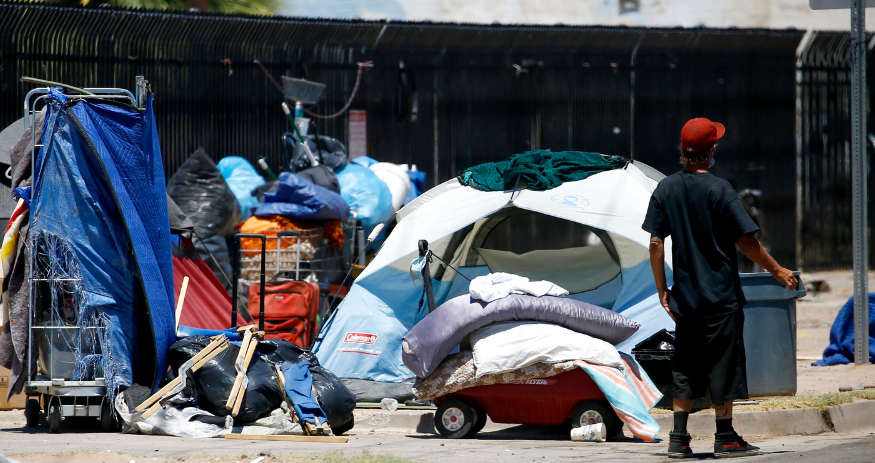Beyond black and white: uniting Arizona to end homelessness
Nicole Newhouse, Guest Commentary//March 20, 2025//
Beyond black and white: uniting Arizona to end homelessness
Nicole Newhouse, Guest Commentary//March 20, 2025//

Arizona’s homelessness crisis is a damning indictment of systemic failure. As lawmakers bicker over ideology and piecemeal policies, the human and economic toll grows — and the looming threat of reduced federal funding could shatter our already fragile system. If Arizona’s leaders continue to prioritize political posturing over collaborative, nonpartisan, well-funded solutions, thousands of unsheltered residents will pay the price — as will the communities in which they live.
Housing first cannot succeed without housing
The Housing First model is praised for its compassion, but its success hinges on one glaringly absent factor: affordable housing. Arizona has a deficit of over 183,000 homes for residents earning 50% or less of the Area Median Income, per the Morrison Institute’s ARCHES 2024 State of Housing. While bipartisan efforts — like allowing casitas and middle housing — are steps forward, local governments have stalled broader reforms due to concerns over “neighborhood character.” Cities have even sued to block ADU mandates, and neighborhoods resist mixed-use zoning near transit corridors. Without these tools, even the best strategies will fail.
Equally troubling is the lack of immediate solutions for those already homeless. Expanding shelters — low-barrier facilities, transitional housing and mixed hoteling options — is essential for short-term relief. Yet, bills like HB2803 aim to restrict one of these flexible solutions reducing, not expanding, much needed roofs over heads.
The false choice: treatment vs. housing
The debate is often framed as Treatment First versus Housing First, but this is a false dichotomy. Recovery from addiction is a process that requires time, trust and stability. Integrated care — combining addiction treatment, mental health services and housing — is the most effective approach. Policies like HB2437 — which propose drug-free homeless zones, may aim to create safer communities, but they risk undermining recovery by prioritizing enforcement over care. Staff would end up focused on self-protection rather than providing the compassionate support needed for long-term healing.
A disjointed system: agencies working in silos
Arizona’s homelessness response isn’t just underfunded — it’s catastrophically uncoordinated. At least six state agencies — DES (economic services), AHCCCS (Medicaid), ADOH (housing), ADE (education), DCS (child safety), and DHS (health services) — all “touch” homelessness through disconnected programs. For example:
- DES provides temporary cash assistance but lacks housing partnerships.
- AHCCCS funds behavioral health services but cannot allocate dollars to housing.
- ADOH manages affordable housing grants but has no authority to coordinate health care.
This bureaucratic maze wastes resources and fails people. Maricopa County reports that 19 people fall into homelessness for every 10 who escape it, yet Arizona ranks 47th in mental health care access and dead last for adults with mental illness receiving any form of treatment.
The math demands urgency — and unity
The crisis is accelerating:
- Over 14,000 Arizonans experience homelessness nightly, with unsheltered rates up 54% since 2020.
- Federal COVID-era housing funds expire in 2024, threatening to eliminate 1,200 temporary shelter beds in Phoenix alone.
- HUD’s Continuum of Care grants, which Arizona relies on, face a $300 million national cut.
A path forward: solutions that demand political courage
To avoid the homelessness crisis from worsening, Arizona must:
- Create a “Homelessness Czar” office: Empower a statewide coordinator to align DES, AHCCCS, ADOH, and cities/counties, with authority to pool funding and set shared targets.
- Merge housing and health care funding: Scale Arizona’s existing Health, Housing, and Opportunity (H2O) Medicaid waiver, which already funds housing navigation, rental assistance and tenancy support for high-risk populations.
- Scale “human-centered” shelters: Replace punitive sweeps or poorly planned “drug-free zones” with low-barrier shelters offering storage, pets and trauma-informed case management.
- Invest in prevention: Expand eviction diversion programs and mandating housing instability screenings at critical transition points — such as foster care exits, corrections reentry — to connect vulnerable populations with housing supports before homelessness occurs.
Homelessness is not inevitable. It is the direct result of policy choices. Arizona’s leaders must choose: Will they cling to fragmented, partisan failures, or finally align housing and health care through authentic nonpartisan collaboration?
The time for unity isn’t “now” — it’s already overdue.
Nicole Newhouse executive director of the Arizona Housing Coalition.


















